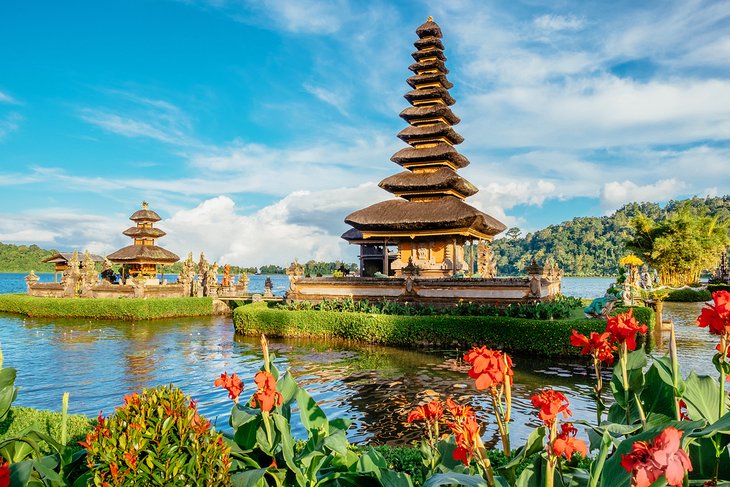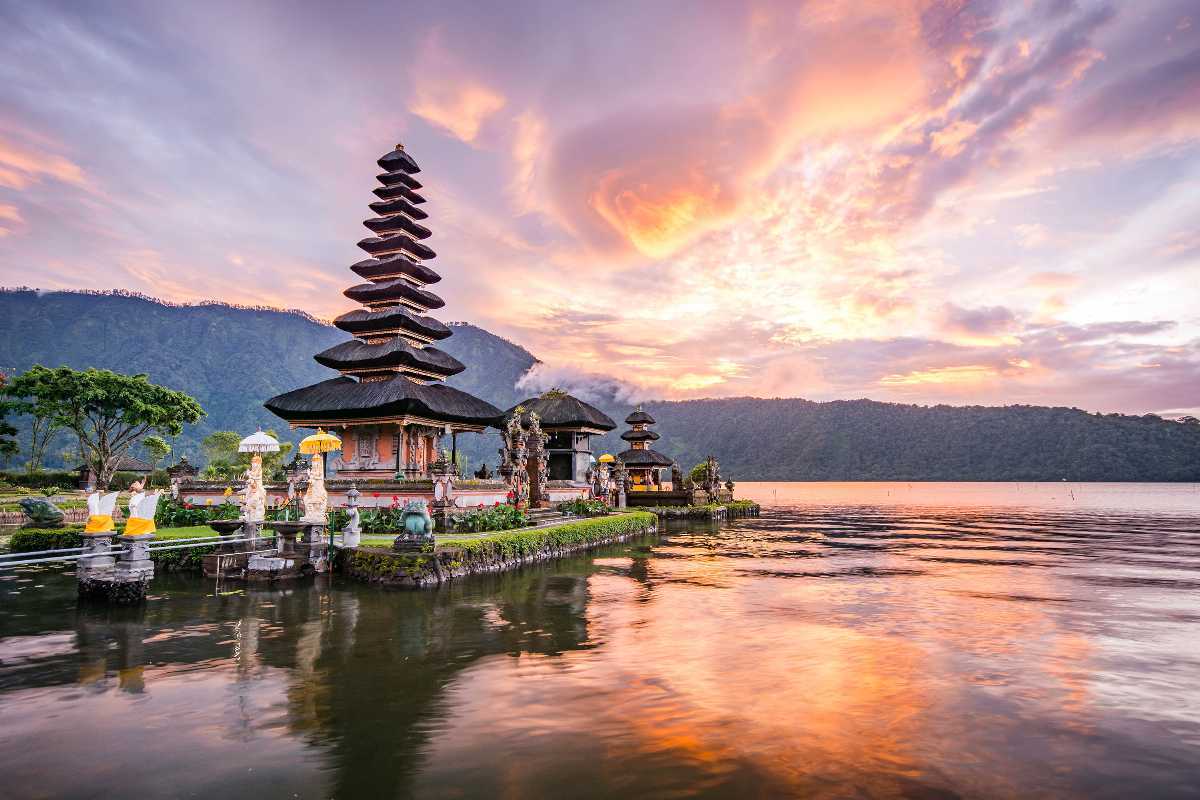
Indonesia, an archipelago nation sprawled across the equator, is a land of breathtaking diversity, a vibrant tapestry woven with ancient cultures, stunning natural landscapes, and a rich history that has shaped its unique identity. From the spiritual heart of Bali to the volcanic majesty of Java and the pristine underwater realms of Raja Ampat, Indonesia offers an unparalleled travel experience for every kind of adventurer. This comprehensive guide will delve into the archipelago’s top attractions, explore its fascinating history, equip you with essential travel tips, illuminate accommodation options, navigate transportation, and reveal the optimal times to visit this captivating Southeast Asian gem.
The Crown Jewels: Indonesia’s Top Attractions
Indonesia boasts a plethora of iconic destinations, each with its own distinct charm and allure. Here are some of the most celebrated:

Related Articles about Indonesia: A Tapestry of Wonders – Unveiling the Archipelago’s Top Attractions:
- London Calling: Your Ultimate Guide to the Best Hotels and Experiences in the Capital
- The Steppe’s Grandeur: Unveiling Kazakhstan’s Premier Hotels and Unforgettable Experiences
- Cape Town: A Symphony of Mountains, Sea, and Culture
- Bangkok: A Symphony of Sights, Sounds, and Sensations – Your Ultimate Guide
- Romania: A Tapestry of Legends, Landscapes, and Unforgettable Experiences
-
Bali: The Island of the Gods: Bali needs little introduction. Renowned for its emerald rice paddies, volcanic mountains, and pristine beaches, it’s a spiritual and cultural haven. Ubud is the island’s cultural heart, offering yoga retreats, traditional dance performances, and the sacred Monkey Forest. Seminyak and Canggu are popular for their trendy cafes, surf breaks, and vibrant nightlife. Don’t miss the iconic Tanah Lot Temple, perched dramatically on a rock formation offshore, and the majestic Uluwatu Temple, offering spectacular sunset views over the Indian Ocean.
-
Borobudur Temple, Java: A UNESCO World Heritage Site, Borobudur is the world’s largest Buddhist temple, a monumental testament to ancient Javanese artistry and spirituality. Built in the 9th century, its intricate reliefs depict Buddhist teachings and tales, creating a mesmerizing journey for visitors. Witnessing the sunrise from its upper levels, with mist-shrouded temples and volcanoes in the distance, is an unforgettable experience.
-
Mount Bromo, Java: This active volcano, part of the Bromo Tengger Semeru National Park, is an iconic Javanese landscape. The surreal sight of the steaming crater rising from a vast volcanic sand sea, often shrouded in ethereal morning mist, is truly awe-inspiring. A jeep tour to the viewpoint and a trek to the crater rim are essential experiences.

-
Komodo National Park, East Nusa Tenggara: Home to the legendary Komodo dragon, the world’s largest lizard, this park is a UNESCO World Heritage Site and a must-visit for wildlife enthusiasts. Explore the rugged islands of Rinca and Komodo, trek to see these magnificent creatures in their natural habitat, and snorkel or dive in the crystal-clear waters teeming with marine life.
-
Raja Ampat, West Papua: Often dubbed the "Amazon of the Seas," Raja Ampat is an archipelago of unparalleled marine biodiversity. Its vibrant coral reefs, home to over 75% of the world’s coral species and an astonishing array of fish, make it a diver’s and snorkeler’s paradise. The iconic karst islands of Wayag offer breathtaking panoramic views.
-
Lake Toba, North Sumatra: The largest volcanic lake in the world, Lake Toba is a serene and majestic destination. Formed by a supervolcanic eruption millions of years ago, the lake boasts an island in its center, Samosir Island, which is home to the traditional Batak villages. Immerse yourself in the unique Batak culture, explore ancient stone chairs, and enjoy the tranquil beauty of the surroundings.
-
Yogyakarta, Java: The cultural capital of Java, Yogyakarta is a city steeped in tradition and artistry. Explore the Sultan’s Palace (Kraton), a living testament to Javanese royal heritage, wander through the vibrant Malioboro Street for local crafts and street food, and witness the intricate batik-making process. Nearby, the Hindu temple complex of Prambanan rivals Borobudur in its architectural grandeur.
-
Lombok: Often considered Bali’s quieter, more rugged cousin, Lombok offers stunning beaches, lush rice paddies, and the majestic Mount Rinjani, Indonesia’s second-highest volcano. The Gili Islands (Trawangan, Meno, and Air) off Lombok’s northwest coast are car-free paradises known for their pristine beaches, excellent snorkeling, and relaxed vibe.
A Glimpse into Indonesia’s Rich History
Indonesia’s history is a complex and fascinating narrative shaped by trade, migration, colonialism, and the struggle for independence.
-
Ancient Civilizations: Early inhabitants arrived thousands of years ago, leaving behind evidence of sophisticated societies. The Srivijaya Empire (7th-13th centuries) dominated maritime trade in Southeast Asia, while the Majapahit Empire (13th-16th centuries) exerted significant political and cultural influence across the archipelago. These empires left behind magnificent architectural marvels like Borobudur and Prambanan, testaments to their advanced civilizations.
-
The Spice Trade and Colonialism: Indonesia’s rich spice resources, particularly nutmeg and cloves, attracted traders from across the globe. From the 16th century onwards, European powers, primarily the Dutch, gradually established control, leading to centuries of colonial rule. The Dutch East Indies, as it was known, was a significant source of wealth for the Netherlands, but also a period of exploitation and oppression for the Indonesian people.
-
The Struggle for Independence: The 20th century saw a surge of nationalism and a fierce desire for independence. Led by figures like Sukarno and Mohammad Hatta, the Indonesian people fought tirelessly against Dutch rule. After years of struggle and a period of Japanese occupation during World War II, Indonesia finally declared its independence on August 17, 1945.
-
Modern Indonesia: Since independence, Indonesia has navigated the complexities of nation-building, economic development, and political reform. It has emerged as a democratic republic and a significant player on the global stage, grappling with challenges such as decentralization, environmental conservation, and cultural preservation.
Navigating the Archipelago: Essential Travel Tips
To make the most of your Indonesian adventure, keep these practical tips in mind:
- Visa Requirements: Many nationalities can enter Indonesia visa-free for tourism purposes for a certain duration. However, it’s crucial to check the latest visa regulations for your specific nationality before your trip.
- Currency: The local currency is the Indonesian Rupiah (IDR). ATMs are widely available in major cities and tourist areas, and credit cards are accepted in hotels, larger restaurants, and shops. It’s advisable to carry some cash for smaller establishments and local markets.
- Language: The official language is Bahasa Indonesia. While English is widely spoken in tourist areas, learning a few basic Indonesian phrases will be greatly appreciated by locals.
- Culture and Etiquette: Indonesians are generally polite and respectful. Dress modestly when visiting religious sites, covering your shoulders and knees. Always use your right hand for giving and receiving items. Public displays of affection should be kept to a minimum.
- Health and Safety: Consult your doctor about recommended vaccinations and malaria precautions for the regions you plan to visit. Drink bottled or filtered water only. Be mindful of street food hygiene. Indonesia experiences natural disasters like earthquakes and volcanic eruptions; stay informed of local advisories.
- Bargaining: Bargaining is common in markets and with street vendors. Do so politely and with a smile.
- Connectivity: Wi-Fi is readily available in hotels, cafes, and restaurants. Purchasing a local SIM card is an affordable way to stay connected.
A Haven for Every Traveler: Accommodation Options
Indonesia offers a diverse range of accommodation to suit every budget and preference:
- Luxury Resorts: From opulent beachfront villas in Bali to sophisticated city hotels in Jakarta, Indonesia boasts world-class luxury resorts offering impeccable service, stunning amenities, and breathtaking views.
- Boutique Hotels: These charming hotels offer a more intimate and personalized experience, often with unique designs and a focus on local character.
- Mid-Range Hotels: Comfortable and well-equipped, mid-range hotels provide excellent value for money, especially in popular tourist destinations.
- Guesthouses and Homestays: For a truly immersive cultural experience, opt for guesthouses and homestays. You’ll often be welcomed into local families’ homes, offering a glimpse into daily life and authentic Indonesian hospitality.
- Hostels: Budget travelers will find a plethora of hostels, particularly in major cities and on backpacker routes, offering dormitory-style rooms and private options.
- Eco-Lodges and Sustainable Stays: Increasingly, Indonesia is offering eco-friendly accommodations that prioritize sustainability and minimize their environmental impact, particularly in pristine natural areas.
Navigating the Vast Archipelago: Transportation
Getting around Indonesia, a country of over 17,000 islands, requires a multi-faceted approach:
- Air Travel: For inter-island travel, domestic flights are the most efficient option. Airlines like Garuda Indonesia, Citilink, and Lion Air connect major cities and popular tourist destinations. Book flights in advance, especially during peak seasons.
- Ferries and Boats: Ferries are a common and often scenic way to travel between islands, especially for shorter distances. Options range from large public ferries to smaller speedboat services.
- Trains: Java and Sumatra have a developed train network, offering a comfortable and scenic way to travel between cities. Train travel is generally more relaxed and offers opportunities to see the countryside.
- Buses: Buses are the most affordable mode of transport for overland travel, connecting most towns and cities. Services can vary in comfort and punctuality.
- Taxis and Ride-Sharing: In cities, taxis are readily available, and ride-sharing apps like Grab and Gojek are extremely popular and convenient for getting around.
- Scooters and Motorbikes: Renting a scooter is a popular way to explore smaller islands and local areas. Ensure you have the necessary license and always wear a helmet.
- Car Hire with Driver: For a more comfortable and hassle-free experience, especially for longer journeys or day trips, hiring a car with a driver is a popular option.
The Golden Windows: Best Time to Visit
Indonesia’s equatorial location means it experiences a tropical climate with two main seasons:
-
Dry Season (April to September): This is generally considered the best time to visit most of Indonesia. The weather is sunny, with lower humidity and minimal rainfall. This is ideal for beach activities, trekking, and exploring outdoor attractions.
- Peak Season: July and August are the busiest months, with higher prices and more crowds, particularly in Bali.
-
Wet Season (October to March): Characterized by higher humidity and frequent, often heavy, rainfall. While rain can be intense, it usually doesn’t last all day, and there are still plenty of sunny spells.
- Advantages: Lower prices, fewer crowds, and lush green landscapes.
- Considerations: Some activities might be affected by weather, and ferry services can sometimes be disrupted.
Regional Variations:
- Eastern Indonesia (e.g., Raja Ampat): The dry season generally runs from October to April, with the wet season from May to September.
- Sumatra and Borneo: These regions experience more consistent rainfall throughout the year, with slightly drier periods in certain months.
For specific interests:
- Diving and Snorkeling: Generally good year-round, but visibility is often best during the dry season.
- Volcano Trekking: The dry season is preferable for clearer trails and safer conditions.
- Cultural Festivals: Research specific festivals you wish to attend, as their dates vary annually.
Indonesia is a land of endless discovery, a place where ancient traditions meet modern vibrancy, and where nature’s grandeur unfolds at every turn. By understanding its top attractions, appreciating its rich history, and preparing with these practical tips, you’ll be well on your way to experiencing the magic of this extraordinary archipelago. Prepare to be captivated, enchanted, and utterly transformed by the wonders of Indonesia.





